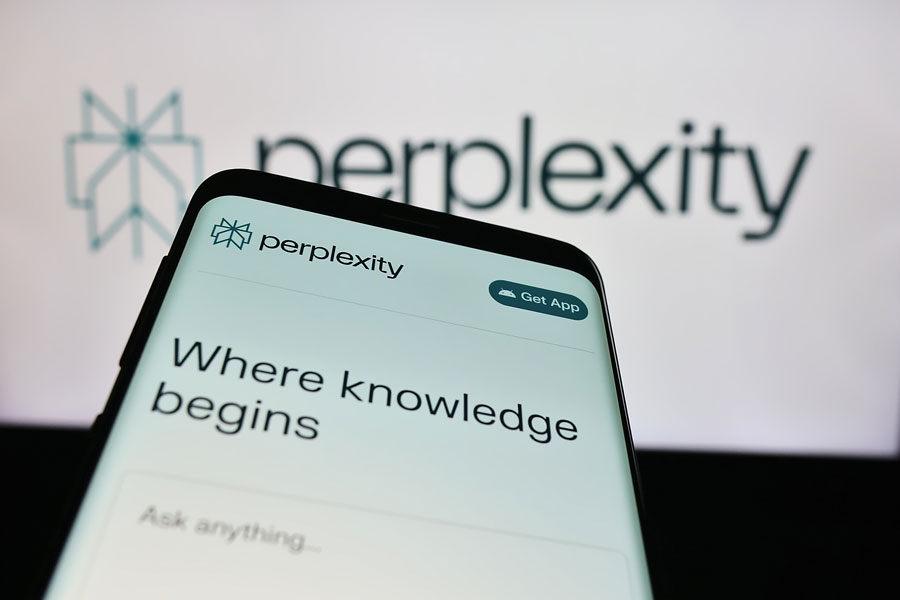AI Search Tools Are Steadily Chipping Away at Google’s Dominance in Web Search; Now 5.6% of U.S. Desktop Searches

NEW YORK, NY – The dominance of Google Search is facing a quiet but measurable shift, as a growing share of users are turning to AI-powered tools like ChatGPT and Perplexity to answer questions, discover information, and conduct everyday searches online.
According to a recent analysis reported by The Wall Street Journal, based on data from web analytics firm Similarweb, AI-driven search tools now account for approximately 5.6% of all U.S. desktop search traffic – a notable figure in a space long dominated by Google, which still commands around 94%. While the margin may seem modest at first glance, analysts say the trend signals a fundamental change in how consumers interact with the internet.
These emerging platforms rely on natural language processing and large language models (LLMs) to provide direct, conversational answers – often bypassing traditional websites and skipping the standard list of blue links users are accustomed to. Tools like ChatGPT, Perplexity, and Microsoft’s AI-infused Bing now offer users instant summaries, citations, and even tailored opinions based on user prompts, reducing the need to click through to third-party sources.
Tech industry observers say this growing preference for AI search reflects a shift in expectations. Users increasingly want answers delivered quickly, clearly, and in context – not buried behind SEO-optimized blog posts or ads. Experts say the rise of AI platforms marks a new era where artificial intelligence isn’t just enhancing search – it is search itself.
This shift is already being felt by content creators, digital marketers, and news publishers, many of whom have seen noticeable drops in organic search traffic due to what’s being called the “zero-click era.” Instead of driving users to websites, AI tools often resolve the query on the spot, keeping users within the platform itself.
While Google has responded with its own AI Overviews and a new Gemini-powered “AI Search Mode,” these changes are also triggering controversy. Publishers have accused Google of summarizing their content without attribution or compensation – raising broader concerns about the sustainability of digital journalism in an AI-first internet.
At the same time, some businesses and brands are starting to adapt their strategies, focusing not just on traditional SEO but also on what’s being called “AIO” — AI Optimization. This includes structuring content for clarity, building strong reputational signals, and ensuring that brand information is readable and usable by LLMs.
Despite Google’s continuing dominance, the rise of AI-first search platforms is expected to accelerate. With AI chat tools now integrated into browsers, mobile devices, and voice assistants, the traditional search box may soon become just one of many paths users take to access information online.
Whether this evolution benefits users, businesses, or platforms in the long run is still an open question – but one thing is clear: the way we find information on the internet is rapidly changing.
How AI Search Tools Are Changing the Way We Find Information
1. What are AI search tools? AI search tools—like ChatGPT, Perplexity, and AI-powered Bing – use large language models (LLMs) to deliver conversational, instant answers to user queries. Instead of listing links, they summarize information and respond in plain language.
2. How are these tools different from Google? Google traditionally provides a ranked list of web links. AI tools answer questions directly, often using summarized information from multiple sources – eliminating the need to click through to individual websites.
3. How much market share do AI search tools have? According to The Wall Street Journal, AI search tools now account for about 5.6% of U.S. desktop search traffic, while Google still holds around 94%. But analysts believe the AI segment is growing rapidly.
4. Why is this trend important? It marks a shift in how people discover information online. Instead of browsing websites, more users are getting their answers directly from AI chat interfaces – changing everything from SEO to publishing strategies.
5. Are websites losing traffic because of this? Yes. Many publishers and business websites have reported traffic declines due to AI tools providing “zero-click” answers—where users find what they need without visiting the original source.
6. Is Google doing anything to compete? Yes. Google has launched AI Overviews and a new “AI Search Mode” powered by Gemini, aiming to deliver AI-generated summaries alongside or instead of traditional links.
7. How can businesses adapt to this change? By optimizing for AI, not just search engines. This includes using clear, structured content; answering real questions; and building strong brand authority that LLMs recognize and trust.
8. Will AI replace search engines completely? Not anytime soon—but it’s evolving fast. Traditional search will likely coexist with AI tools, especially for transactional queries, shopping, and research. Still, AI will dominate quick-answer and exploratory queries.
9. Do AI search tools cite their sources? Some do. Perplexity, for example, includes live source links, while others like ChatGPT may reference general knowledge or cite sources upon request. This is an evolving area with ongoing debate.
10. Should I change how I do SEO? Yes, you should consider “AIO” – AI Optimization. That means formatting content for readability, answering specific user intents, and structuring your information so AI systems can accurately summarize or reference it.


